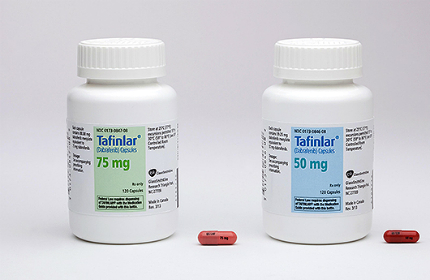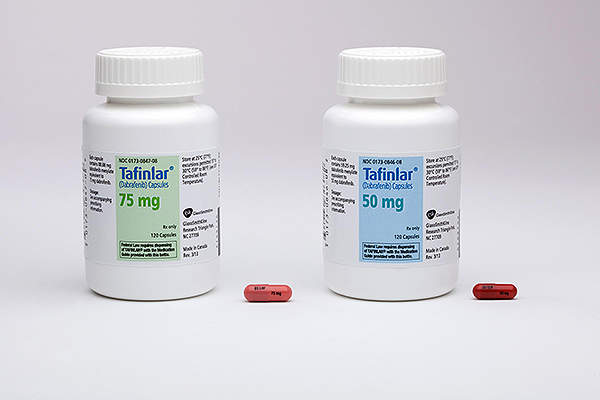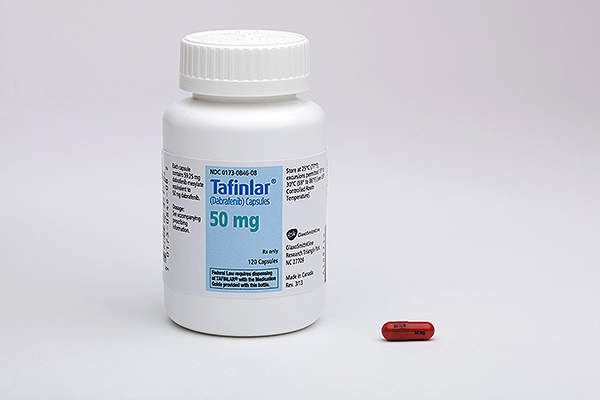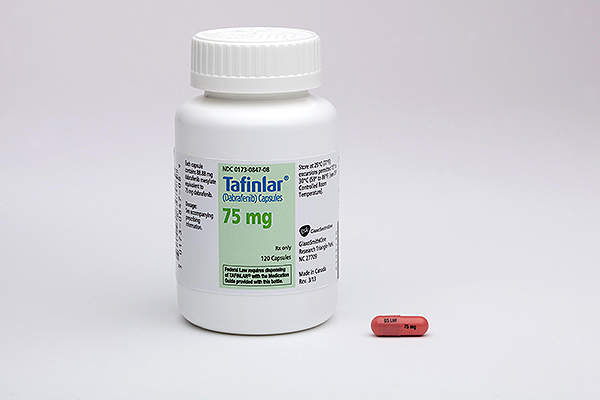
Tafinlar (dabrafenib) is a single-agent oral treatment indicated for the treatment of unresectable or metastatic melanoma in adult patients. The drug is developed and marketed by GlaxoSmithKline (GSK).
GSK submitted New Drug Application (NDA) for Tafinlar to the US Food and Drug Administration (FDA) and the European Medicines Agency (EMA) for the treatment of patients suffering from unresectable or metastatic melanoma in August 2012.
GSK received approval of Tafinlar from the FDA for the treatment of metastatic melanoma with BRAF V600E or V600K mutations in adult patients in May 2013.
Tafinlar is currently under the review of EMA for marketing approval in Europe.
Metastatic melanoma disease details
Melanoma is a fast growing cancer that originates in melanocytes, which are responsible for making the skin colour.
It is the most dangerous and fatal form of skin cancer that initially emanates as a single tumour and spreads to the entire body. When the disease spreads to other parts of the body, it is known as advanced or metastatic melanoma.
Melanoma will result in about 9,480 deaths across the US in 2013, according to the National Cancer Institute’s estimates.
It is also found that about half of the metastatic melanoma patients have a BRAF gene mutation, which enables melanoma tumours to grow and spread in the body.
Tafinlar’s mechanism of action
Tafinlar contains dabrafenib, which inhibits some malformed BRAF kinases. The drug controls the BRAF V600 mutation which may stimulate tumour cell growth and spread it in the body. The drug is available in capsule form for oral administration.
Clinical trials on GSK’s Tafinlar (dabrafenib)
GSK conducted a Phase II clinical study on Tafinlar, known as BREAK-MB study. It was a single-arm, open-label study which enrolled patients in two cohorts. The patients in cohort A were administered with no prior local therapy for brain metastases, while the patients in cohort B were administered with at least one local therapy for brain metastases.
The primary outcome measure of the study was estimation of the overall intracranial response rate (OIRR) in each cohort. The OIRR in both the cohorts was 18%. The median duration of response was 4.6 months in both the cohorts.
The approval of Tafinlar is based on results from a Phase III open-label, randomised, multicentre, international clinical trial known as BREAK-3 study. The trial enrolled 250 adult metastatic melanoma patients with BRAF V600E mutation. The patients were administered with Tafinlar or dacarbazine (chemotherapy) in a 3:1 ratio.
The primary endpoint of the study was the progression-free survival (PFS). The secondary endpoints included independent radiology review committee (IRRC) assessed PFS, confirmed objective response rate (ORR) and duration of response.
The results of the study demonstrated that patients treated with Tafinlar statistically showed a significant increase in PFS when compared to dacarbazine. The median PFS in Tafinlar-administered patents was 5.1 months, while it was 2.7 months in dabrafenib arm patients. The ORR in Tafinlar arm patients was 52%, compared to 17% in the dacarbazine group.
The most common adverse reaction found in the Tafinlar-administered patients during the clinical study included hyperkeratosis, headache, pyrexia, arthralgia, papilloma, alopecia, palmar-plantar erythrodysesthesia, rash, back pain, myalgia, constipation and nasopharyngitis.
Marketing commentary for GlaxoSmithKline’s drug
GSK plans to make Tafinlar available for prescription no later than the early third quarter of 2013.
In 2010, GSK entered into a Tafinlar co-development agreement with bioMérieux, which provided assistance in the clinical diagnostic tests to detect BRAF V600 gene mutations with its FDA-approved THxID™-BRAF tests.
Other medications approved for the treatment of metastatic melanoma include Yervoy (Ipilimumab), developed by Bristol-Myers Squibb, and Zelboraf (vemurafenib), manufactured by Plexxikon and Roche.
Related content
Yervoy (Ipilimumab) – Therapy for Treatment of Metastatic Melanoma, US
Yervoy is a monoclonal antibody drug indicated for treating metastatic melanoma. The drug was developed by Bristol-Myers Squibb.
Zelboraf (Vemurafenib) Tablets – Treatment for Metastatic Melanoma
Zelboraf is a drug indicated for the treatment of Metastatic Melanoma. The drug was developed by Plexxikon in collaboration with Roche.





